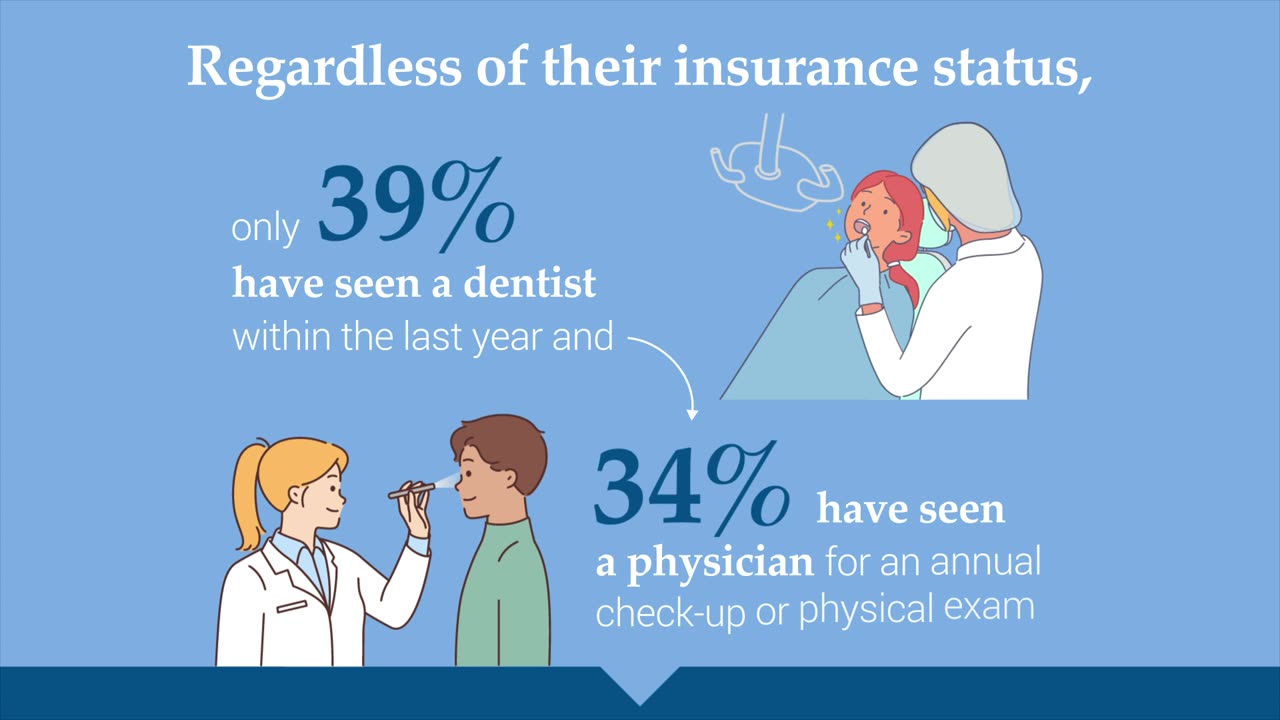Premium Only Content

2 in 3 only see a doctor when something feels extremely wrong, survey finds
Nearly two-thirds of Americans only go to the doctor when something feels “extremely wrong,” new research suggests.
A recent survey of 2,000 respondents found that 64% take a more reactive approach to their health, rather than a proactive one.
Men polled were particularly susceptible to this – 79% said they only go to the doctor in “extremely wrong”-feeling cases compared to 59% of women.
The survey, conducted by OnePoll on behalf of the Henry Schein Cares Foundation, also found that the average respondent had their last checkup two and a half years ago.
Sixty-five percent have not been screened for high blood pressure within the past five years, and 66% have not been screened for high cholesterol.
Approximately three-quarters of women have not had a mammogram or pap smear in the past five years, and 70% of men have not had a prostate exam in that time.
Overall, only 48% of insured respondents have gone to a physician for a physical exam within the past year.
Only 44% of all respondents have dental insurance, and respondents have gone an average of two years since their last routine dental cleaning or check-up.
Interestingly, 39% of those polled have seen a dentist within the last year, regardless of their insurance status, compared with only 34% who have seen a doctor for an annual check-up or physical exam.
In general, 78% of respondents said they feel comfortable at doctor appointments, but nearly one-third (27%) were more afraid of going to doctor’s appointments now more than they were before the pandemic.
Still, some of respondents’ least favorite parts of medical appointments don’t involve the doctor at all, such as sitting in the waiting room (29%) and taking the time to go to the appointment itself (21%).
Overall, Gen X and Baby Boomers were the least bothered by medical appointments, while Millennials and Gen Z ranked being touched or examined (22% and 27%), feeling pain (21% and 24%) and overall fear (21% and 22%) as among the top things that they dislike about visiting the doctor.
Results also showed that respondents generally trust their doctor's advice — with two-thirds of the overall group surveyed falling somewhere between “completely” and “mostly” trusting their counsel.
The survey also revealed that one in ten (10%) of Gen Xers said they “never” trust their doctor’s overall medical advice.
The biggest red flags patients look out for are doctors who appear to be disinterested in their well-being (40%).
“Despite all of the evidence underscoring the importance of regular preventive health care and screenings, many patients forgo or delay their care as a result of a lack of health literacy around the importance of preventive care or a lack of personal connection with their provider,” said Maureen Knott, President of the Henry Schein Cares Foundation. “Patients are much more likely to follow through with regular preventive healthcare when they are informed and experience a trust-based and compassionate relationship with their clinicians and all other members of their health care team.”
Overall, more than half (53%) say it is difficult to access medical care, and one in three (35%) say they would benefit from more information and education about the importance of screenings.
Just half (51%) of respondents have a rainy day fund for emergency medical needs totaling an average of more than $2,800 ($2891.15).
“This survey illuminates the structural, financial and behavioral challenges that persist as inhibitors to patients accessing preventative care,” said Allison Neale, Vice President of Public Policy for Henry Schein, Inc. and Managing Director of the Henry Schein Cares Foundation. “Yet regular access to integrated, preventive care has been shown to be a key component of improved overall health outcomes for patients, which benefits not only individuals, but also communities and our whole society through better health, increased productivity and economic growth. As it turns out, the old adage that an ounce of prevention is worth a pound of cure really is true.”
Survey methodology:
This random double-opt-in survey of 2,000 general population Americans was commissioned by Henry Schein Cares Foundation between February 21 and March 2, 2023. It was conducted by market research company OnePoll, whose team members are members of the Market Research Society and have corporate membership to the American Association for Public Opinion Research (AAPOR) and the European Society for Opinion and Marketing Research (ESOMAR).
-
 1:14
1:14
SWNS
12 days agoHow Americans build the perfect grilled cheese
38 -
 1:01:56
1:01:56
ThisIsDeLaCruz
14 hours ago $1.50 earnedInside Kenny Chesney’s Sphere Part 1: Exclusive Backstage Pass
10.3K -
 LIVE
LIVE
DLDAfterDark
3 hours ago $0.41 earnedA Complete Look Into The Glock "V Series"! Pistol In Hand! VERY GAY!!
157 watching -
 7:42
7:42
China Uncensored
11 hours agoIndia Has Surpassed China
11.9K10 -
 8:47
8:47
Hollywood Exposed
9 hours agoJoe Rogan and Zachary Levi DESTROY Gavin Newsom’s Lies About California
6.32K3 -
 LIVE
LIVE
BlackDiamondGunsandGear
3 hours agoInside NEW Glock V Models / Whats Next? / You giving up Glock?
265 watching -
 2:05:31
2:05:31
Glenn Greenwald
7 hours ago"Former" Al-Qaeda Leader Welcomed to the White House; The "New TikTok" Clamps Down on Israel Critics: With Influencer Guy Christensen; Dave Portnoy Decries Cancel Culture, Unless His Group is Under Attack | SYSTEM UPDATE #545
123K58 -
 7:30:07
7:30:07
Spartan
8 hours agoNine Sols
7.2K -
 2:34:56
2:34:56
SOLTEKGG
3 hours ago🔴 HUGE UPDATE - Veterans Day | Redbull x Dogtag Giveaway
8.84K1 -
 1:23:36
1:23:36
Flyover Conservatives
12 hours agoTough Love for Trump: What Must Change Now to Win Back America - Dennis Michael Lynch | FOC Show
18.7K4